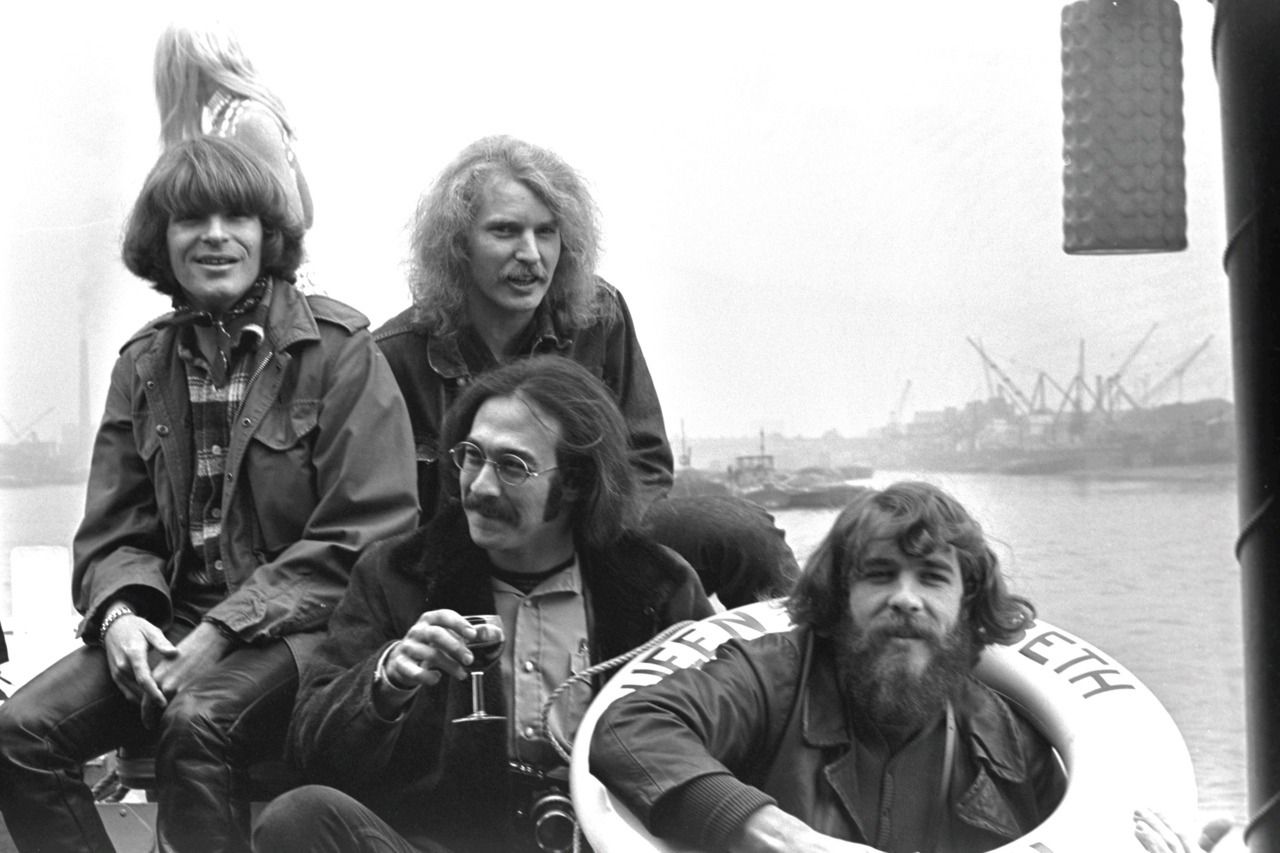
“Door to Door” is CCR’s small, sly portrait of working life—a two-minute shuffle where ambition knocks politely, and desire answers in half-smiles.
If Creedence Clearwater Revival were usually the band of big American archetypes—rivers, rain, bad moons, and hard truths—then “Door to Door” is something more intimate: the sound of ordinary shoes on an ordinary porch, trying to make a living and maybe steal a little sweetness along the way. It was written and sung by bassist Stu Cook, and it appears on CCR’s final studio album, Mardi Gras, released April 11, 1972 on Fantasy Records. On the album’s official track list it sits near the end—Side Two, Track 4—running 2:09, credited simply to Cook, with Cook also taking the lead vocal.
Because you asked for the “debut position at release,” the most historically accurate way to describe “Door to Door” arriving in the world is this: it first surfaced publicly as the B-side of CCR’s July 1971 single “Sweet Hitch-Hiker.” B-sides rarely received their own separate chart debuts, but the single that carried it did—“Sweet Hitch-Hiker” entered the Billboard Hot 100 at No. 68 on the chart dated July 17, 1971, and later peaked at No. 6. So “Door to Door” arrives like a shadow beside the headline, quietly riding into record shops on the back of CCR’s last great Top 10 run.
Then, in 1972, it found its permanent home on Mardi Gras—an album with its own telling chart footprint. On the Billboard 200, the album debuted at No. 63 (chart date April 29, 1972) and climbed to a peak of No. 12. Commercial success, yes—but the atmosphere around the record was complicated. Mardi Gras was CCR’s only studio album as a trio after Tom Fogerty’s departure, and—crucially—it spread writing, singing, and production duties across all remaining members, not just John Fogerty. Even the recording timeline tells a story: Wikipedia notes that “Sweet Hitch-Hiker” and “Door to Door” were recorded in spring 1971, while much of the rest of the album was finished in January 1972, across Wally Heider in San Francisco and Fantasy’s Studio A in Berkeley. It’s a band still moving forward, but with the seams beginning to show.
And that’s where “Door to Door” becomes quietly poignant. It doesn’t sound like collapse; it sounds like somebody trying to remember who they were before the posters, before the pressure, before the arguments. A long-running CCR song resource describes it as a shuffle that looks back at the band’s pre-fame working days—specifically linking the “door-to-door” premise to Doug Clifford’s real-life experience as a salesman. Greil Marcus, writing about Mardi Gras, heard the song as a strange little narrative of selling “cleaning fluid” and flirting—half hustle, half temptation—yet somehow, in his telling, it “made it.” That reading fits the music: it’s got a knowing grin, but there’s also a tired honesty underneath, the sense of a man who’s done this route too many times and is learning which doors open and which never will.
What “Door to Door” means—beyond its surface charm—is the way it frames ambition as something unglamorous and repetitive. Not destiny. Not triumph. Just knocking, trying, smiling, trying again. In the CCR universe, that’s almost radical. Their classics often move like storms: sudden, mythic, inevitable. “Door to Door” moves like a day job.
And because it’s Stu Cook at the mic, it carries another layer: it’s one of the moments on Mardi Gras where you can hear the band attempting democracy—each member stepping forward, each voice asking to be counted. That attempt is part of the album’s history, and part of its sadness: an effort to share the load, arriving right as the machine was breaking down.
So when you play “Door to Door” now, it doesn’t feel like a “minor track.” It feels like a small photograph found in the back of a drawer—proof that even the biggest bands once lived in the ordinary world, where you measured your worth in small sales and smaller chances, and hoped that the next door might finally lead somewhere. In two minutes, Creedence Clearwater Revival make that hope swing. And then, almost before you’re ready, the song is gone—like footsteps fading down a porch step, heading toward the next house, the next life, the next ending.